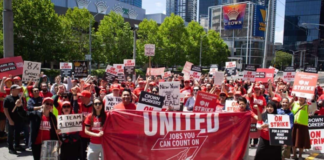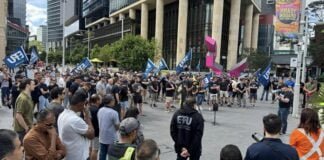In February, Sensis workers in Melbourne staged a 150-strong rally to protest against the company’s plans to cut 689 permanent positions and 100 temps. Three hundred and ninety-one jobs are being outsourced. The workers voted to take unprotected strike action and walked off the job for the rest of the afternoon.
The company is targeting the most unionised sections of the company.
Sensis, wholly-owned by Telstra, claims its profits are being squeezed by declining print revenue from the Yellow and White Pages. But the directories company made $685 million profit last year, while Telstra recently declared a record $1.6 billion half-year profit.
Sensis also claims it is making a transition to a digital business, but it is firing its online workforce!
The job cut plan is blatant cost-cutting aimed at increasing profits.
Sensis CEO John Allan claims the outsourcing is not a cost-cutting measure. But when he was asked by the workers’ union, the Australian Manufacturing Workers’ Union (AMWU), to provide the information used to make the decision, the response was, “I should note now that we are not required to provide any of the information that Sensis has used to formulate the proposed changes, and we will not be providing this”.
Sensis is counting on its unionised workforce going quietly. But although they are a minority of Sensis’s 2000 employees, the stand taken by the AMWU members has started to spread the fight.
Another, potentially larger, protest rally is being planned. This rally will actively involve NSW Sensis workers, as well as Sensis’s Community and Public Sector Union (CPSU) members, who are affected by outsourcing and sales staff cuts of over 200 jobs.
Only days after the February Sensis rally, AMWU officials pulled delegations off many worksites to build a 2000 strong rally against “457 visa rorts”. Jobs are not threatened by 457 visas (see page 6), but hundreds of union jobs are immediately threatened at Sensis by Aussie bosses. If the AMWU was willing to spread the fight at Sensis, and similarly pull delegations off the job to back the workers, it would be a substantial boost to a real fight for jobs.
With morale at rock bottom, productivity has slumped, something which is already hurting the company. Members have voted to call a mass meeting if any worker is hassled for low productivity.

The industrial campaign will need to be stepped up if Sensis is to be beaten. As well as completely banning any co-operation with the outsourcing (such as training or transferring technology), a serious strike has to be on the table. Industrial action can make it too costly for Sensis to proceed with the sackings.
It’s Aussie bosses who are sacking Sensis workers
Some sections of the union are keen to portray the fight at Sensis as a fight for “Aussie jobs”. But Sensis jobs are not being taken by lower paid workers in India and the Philippines; Sensis workers are being sacked by Aussie bosses.
Even highlighting “offshoring” over “outsourcing” can feed into the idea that the problem is with overseas workers.
The KMU, the major Philippines union, has sent a solidarity resolution supporting the Sensis workers fight for jobs. Filipino workers have been waging their own high profile campaign against outsourcing by Philippine Airlines.
Outsourcing is a problem whether offshore or onshore. Sensis has previously used the Julia Ross agency to employ an army of temps on wages $10,000 a year less, with no annual or sick leave.
Strong fight can draw political support
Legislation requires Telstra to produce the White Pages.
Section 9 of the Telstra Corporation Act 1991 means the Minister can give Telstra any directions, “as appear to the Minister to be necessary in the public interest.”
A high profile industrial campaign could help pressure the Minister and the Labor government into using this power to oppose the job cuts. After meeting Sensis delegates, Greens’ deputy leader Adam Bandt is considering putting a motion to Parliament to stop the job cuts.
The fight for jobs should push for political support, but it can’t rely on it. Sensis and Telstra are massively profitable. They are not going out of business. They are vulnerable to industrial action. The fight by Sensis workers, backed with solidarity action, has the potential to beat the sackings.
By AMWU delegate at Sensis





